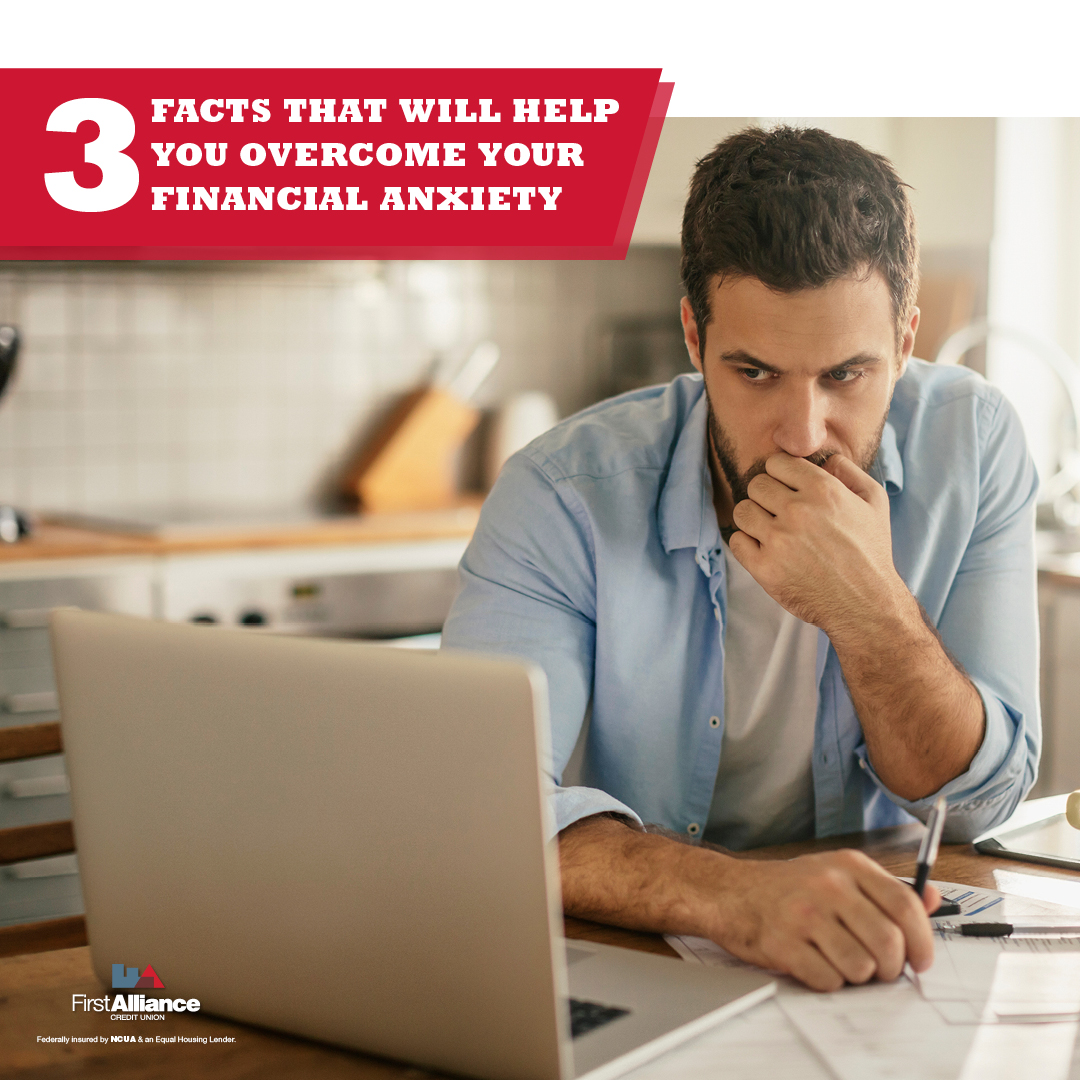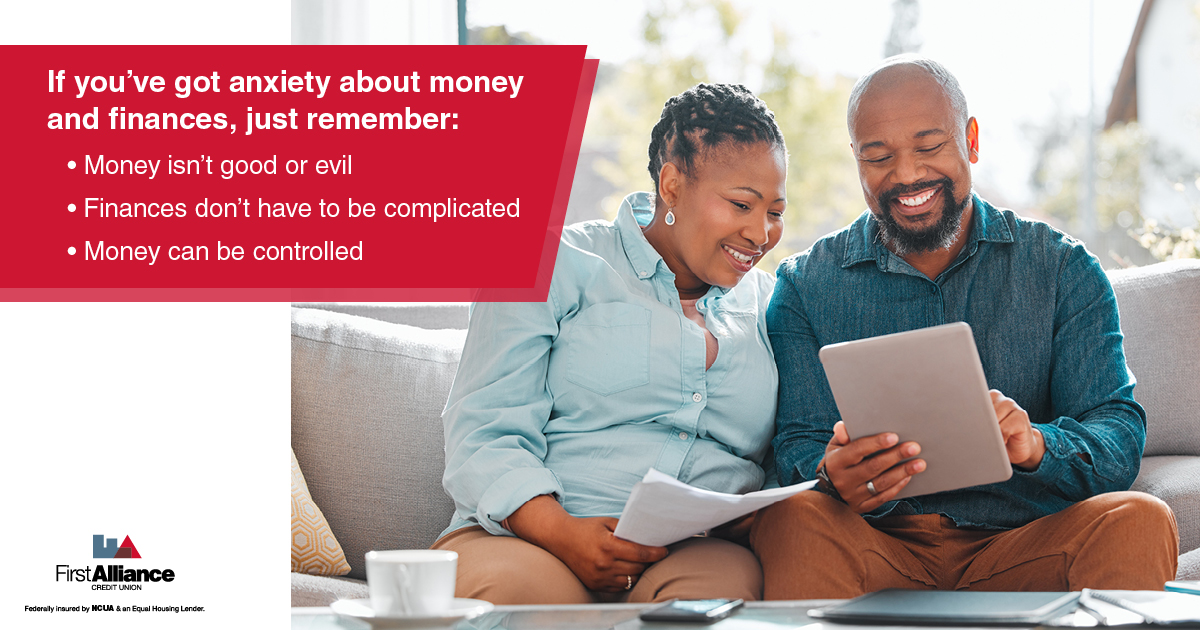Reassessing Your Financial Plans in Five Simple Steps
Plans change all the time, and financial plans are no exception. You might have planned your financial goals for the year, but as time goes on you...
5 min read
 Chris Gottschalk
:
Nov 2, 2023 4:45:00 AM
Chris Gottschalk
:
Nov 2, 2023 4:45:00 AM

When you become an adult, you stop being worried about things like ghosts, devils and monsters lurking in the dark. That’s mostly because those imaginary fears get crowded out by real-world fears, and money is at the root of a lot of them. According to a 2023 Bankrate survey, over half of the responders said that money worries have a negative impact on their mental health.
To be fair, people have a lot of legitimate reasons to have financial anxiety. But the fear of money is like a lot of other fears—the more you know about it, the less scary it becomes. These three facts will reveal why you never have to be afraid of money and finances.

Before we dive into these facts, it’s good to understand the causes of financial anxiety. One of the major reasons is due to negative experiences. If you’ve ever had money issues due to poverty, coped with an unsteady paycheck or had to claw your way out of debt, why would you want to open yourself up to even more traumatic experiences involving money?
Bad experiences aren’t the only reason you might have financial anxiety, though. Money and finances in general can be intimidating. There are a lot of terms you’ll only encounter in the world of finance, and not knowing what they are can leave you feeling like you’re in an alien land, unsure of what money move to make first.
Even more frightening is the fear of what might happen if you make the wrong financial choice. What happens if you apply for a loan with the wrong terms, get a credit card with too high of an interest rate or put too much money in the wrong bank account? Worse, what if you follow the wrong financial advice and end up financially ruined?
These are all legitimate reasons to be scared of money. Here’s why you don’t need to be scared at all.
The first fact that will help you conquer your fear of money is to realize that money isn’t inherently good or evil. It’s a tool. Nothing more, nothing less.
Admittedly, people can have negative feelings about money, such as greed, and seeing people showing off expensive cars or houses might lead you to think that money has some inherent goodness, but that isn’t the case. It’s worth reiterating that money is a tool, and in most cases, it’s just a means to an end.
Thinking of money as a tool can make finances a lot less threatening. Most people aren’t scared of tools used for other purposes, like a flashlight or a blender. When you think about money as a tool, you've taken the first step towards getting rid of negative thoughts associated with money and instead started thinking about the best way to use it.
Money is a medium of exchange, typically in the form of coins, banknotes, or digital transactions. It represents value and makes the exchange of goods, services, and resources easier. Money also enables economic activities and more abstract financial transactions, like stocks.
It’s easy to feel like money and finances are way too complicated for the average person, and to be fair, some financial transactions are complex. However, the truth is that money is nowhere near as complicated as some people would have you believe. When you realize this, your financial anxiety will reduce drastically.
One of the biggest examples of this is a credit score. Many people feel that credit scores are some unknowable formula and that you’re stuck with whatever credit score the credit reporting bureaus assign to you. However, if you want to raise your credit score, you just need to take the following steps:
This might take some effort, but it isn't complicated.
Even if you are having trouble understanding some aspect of finances, there are thousands of articles and how-to videos on the Internet that will help you understand. All it requires is some time and patience.
It’s worth mentioning that First Alliance Credit Union has a lot of resources in our resource center that can help you learn more about money and improve your financial literacy, including:
Knowing that money is a tool and that it’s not that complicated leads almost naturally to the final, and most important, fact to help you overcome your anxieties money: it can be controlled.
This is so important it bears repeating: Money can be controlled.
This statement can be revolutionary to a lot of people since a lot of times it can seem like money controls us. After all, we need to pay rent or mortgage, or we won’t have a home, and we have to pay for expenses like groceries, or else we won’t eat. However, you are always in control of your financial decisions, and you ultimately get to decide how and where you'd like to spend your money.
Admittedly, you might really want to keep paying your rent or mortgage, and you can’t just stop eating. However, you can choose how much you want to pay in rent and find a home within that range, and you can choose the type of groceries you buy and what you make with them.
You can take charge of your financial situation and effectively manage your money by creating a budget and growing your savings. Here's how to get started:
A budget is your best friend if you want to get control of your money. When you create a budget, you give yourself an overview of where you spend your money each month. You can see where all your money goes each month, and from there you can figure out if you’re happy with your spending habits, or if you'd like to adjust where you spend money each month.
Perhaps even more importantly, creating a budget fundamentally changes your relationship with money. When you know where you’re spending money and feel empowered to change your habits, you start lowering your financial stress. You'll know if you have enough money to cover an expense, or if you'll be overspending.
The best thing about creating a budget is that it isn't hard. Here's what you have to do:
You can find several budgeting apps and budget calculators online, including the free downloadable budget calculator offered by First Alliance Credit Union.
Another way to take control of your money is to build up your savings. When you put money aside in an emergency fund, you’re not only giving yourself a way to pay for unexpected expenses like car repairs or medical bills when they come up. You’re also taking steps to reduce your financial anxiety by lowering the possibility that an emergency will completely derail your finances.
Of course, putting money aside in a savings account is easier said than done, especially when you're living paycheck to paycheck. However, even small contributions can add up over time and provide a sense of security. Start by setting aside a specific amount each month, no matter how small, and gradually increase it as your financial situation improves.
If you really want to ensure you'll stick to your savings plan, consider automating the process. You can use Direct Deposit to split your paycheck, so a certain amount gets diverted to your savings account on a regular basis. This way, the money will be deducted before you have a chance to spend it, making it easier to stick to your savings goals.
You don't just have to save money to prepare for emergencies, though. You can also set aside money for short term and long term financial goals, from taking someone out on a nice date to making a down payment on a mortgage.
If you’re scared of money, keeping three facts in mind can help you conquer your fears. Remember:
When you keep these facts in mind, money becomes a lot less scary.
If you want to completely and finally get over your fear of money, though, become a member of First Alliance Credit Union. In addition to the free resources we offer, our member advisors and loan advisors can help answer any financial questions you have, including budgeting money and saving strategies. They can even help guide you through the loan application process and show you which of our resources will help you the most.

Plans change all the time, and financial plans are no exception. You might have planned your financial goals for the year, but as time goes on you...
.jpg)
When you get your paycheck, how do you feel? Are you confident that you’ll not only have enough money to pay all the bills that are due before your...

For most of us, 2020 is a year most of us are only too happy to be done with. It’s been 12 long months of disease, disasters and strife, but 2021 is...